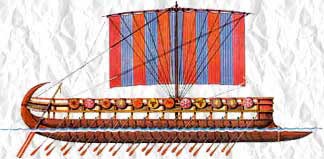

Balbi Surname
 The Balbi surname is believed by some researchers and historians to be of Phoenician origin. The Phoenicians probably arrived from the Persian Gulf around 3000 B.C. They referred to themselves as Canaanites, meaning merchants, as early as 2500 B.C. The Greeks later renamed them the Phoenikes or Phoenicians after a prized purple cloth they exported. The Phoenicians inhabited a narrow strip of the Syrian coast in the geographic area that now comprises Lebanon and parts of Syria and Israel. By 2000 B.C. they had established the East Mediterranean cities of Byblos, Tyre, Sidon, Berytus (Beirut), Tripoli, Arvad Island-City, Baalbek and Caesarea.
The Balbi surname is believed by some researchers and historians to be of Phoenician origin. The Phoenicians probably arrived from the Persian Gulf around 3000 B.C. They referred to themselves as Canaanites, meaning merchants, as early as 2500 B.C. The Greeks later renamed them the Phoenikes or Phoenicians after a prized purple cloth they exported. The Phoenicians inhabited a narrow strip of the Syrian coast in the geographic area that now comprises Lebanon and parts of Syria and Israel. By 2000 B.C. they had established the East Mediterranean cities of Byblos, Tyre, Sidon, Berytus (Beirut), Tripoli, Arvad Island-City, Baalbek and Caesarea.
Among their greatest achievements was the development of the modern alphabet. They were also the most skillful shipbuilders and navigators of their time, credited with discovering and using the North Star to keep their bearings at sea. The Phoenicians established trade routes to Europe and Western Asia, and were the first to circumnavigate Africa. They traded wood, a special purple cloth, dyes, embroideries, wine, decorative objects, ivory and wood carvings. They established numerous cities throughout the Mediterranean including Cyprus, Rhodes, Crete, Malta, Sicily, Sardinia, Marseilles and Carthage. They worked the silver mines of Spain and passed through the Strait of Gibraltar.
Balbi, or in Latin, Balbus is one of the few surnames that has remained unchanged over the centuries. Its origin is possibly derived from the word baal, meaning owner or master and was also the name of an important Phoenician deity, Baal. In an attempt to secure the protection of the god Baal for their children, there was a preference among Phoenicians to use names compounded with that of the deity. Another theory about the origin of the Balbi surname holds that in later centuries when the Romans encountered members the Phoenician family they called them balbus, or stutterers because of the nature of the foreign language they spoke. The earliest reference to the Balbi surname was in the Phoenician civilization around 2500 B.C. The next historical reference to the surname relates to the Phoenician city of Gades, now Cadiz, Spain. By 1000 B.C. some of the Phoenician Balbis had settled in Gades. They were very wealthy and were said to have owned it.
 English
English Italian
Italian Spanish
Spanish